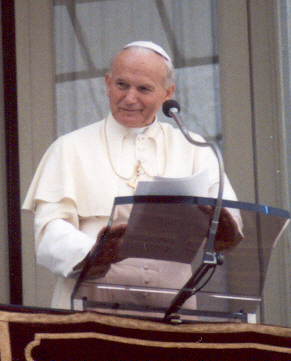
Church Authority-Our Fathers in Faith
Return to
Index The Catholic Faith
Return to Level
Two Topic Index
Home Page
Besides our parents and the state there is another society that has authority over us and demands our obedience and allegiance. That is the Catholic Church as founded on earth by Jesus.
It is Jesus who gave to the Church its mission to save souls, to teach all men the truths of the Faith, and to govern the Church as a body. Establishing the Church was the means Jesus chose to remain with us always and to lead us to his Heavenly Kingdom, our final goal.
The Vicar of Christ
It is Jesus who is the Head or Ruler of his Church. he is the one who has given the authority to the pope to rule the Church on his behalf. It was to St. Peter, the first pope, that Jesus said: "I will give you the keys of the Kingdom of Heaven, and whatever you bind on earth shall be bound in Heaven, and whatever you loose on earth shall be loosed in Heaven" (Mt 16:19).

Including our present Pope, John Paul II, there have been 264 popes, and the authority of St. Peter has been passed on to each one down to our own day. The mission of the Church is to preach the gospel and lead all people to holiness. The pope is chiefly responsible for seeing that this mission is accomplished. It is for this purpose that the pope and bishops, as successors of the apostles, have the authority to make the precepts or laws and disciplines of the Church.
A bishop is the chief authority in his own diocese as long as he governs in union with the pope. He delegates some of his authority to the priests of his diocese. The priests, the bishops, and the pope are all instruments of Christ, who governs his Church through these ordained ministers. The Church is carefully governed so that it may be clearly recognized by the unity of its faith and worship.
Unity of Faith
To make sure that the Faith is taught correctly and the gospel preached to all without error, the pope has the authority to declare just what is to be taught. He answers moral questions and addresses himself to any current problem which affects the lives of Christians. The pope does this in his speeches, encyclicals, letters, and declarations. The bishops do the same in their dioceses, usually through pastoral letters which are read to us in Church.
One in the Sacraments
Since it is through the sacraments that the Church fulfills its role in sanctifying men, it is necessary that they be administered in a consistent way in all times and places. It is the Church that determines what is required to receive each sacrament: for example, how old a person must be and what the accompanying ceremony should include. The Church also sets the requirements for becoming and remaining a member of the Church.
Holy Mother Church
The Church is often referred to as our Holy Mother Church. This denotes the attitude we should have toward the Church and her leaders. Like all mothers, the Church exists to give us life and to provide for our well-being and development until we reach our final goal. We should have great reverence and love for the Church, because Jesus gave us the Church as a sign of his love for us.
Precepts of the Church
1. To keep holy the day of the Lord's Resurrection; to worship God by participating in Mass every Sunday and holy day of obligation; to avoid those activities that would hinder renewal of soul and body on the Lord's day.
2. To lead a sacramental life; to receive Holy Communion frequently and the Sacrament of Penance regularly-minimally, to receive the Sacrament of Penance at least once a year (annual confession is obligatory only if serious sin is involved); minimally also, to receive Holy Communion at least once a year, between the First Sunday of Lent and Trinity Sunday.
3. To study Catholic teaching in preparation for the Sacrament of Confirmation, to be confirmed, and then to continue to study and advance the cause of Christ.
4. To observe the marriage laws of the Church; to give religious training, by example and word, to one's children; to use parish schools and catechetical programs.
5. To strengthen and support the Church - one's own parish community and parish priests, the worldwide Church, and the pope.
6. To do penance, including abstaining from meat and fasting from food on the appointed days.
7. To join the missionary spirit and apostolate of the Church.
Used with the permission of The Ignatius Press 800-799-5534
Return to
Index The Catholic Faith
Return to Level
Two Topic Index
Top
Home Page